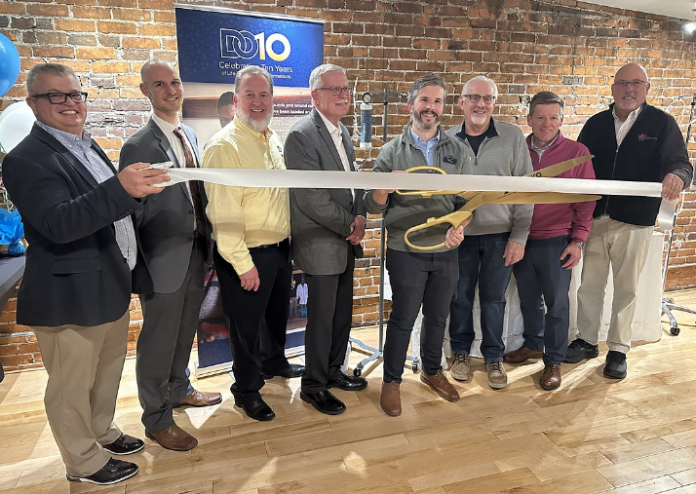
By David Slone
Times-Union
WARSAW — A nonprofit Christian organization that works around the world to alleviate poverty now has an office in downtown Warsaw.
Design Outreach celebrated the new office at the Kosciusko Economic Development Corporation (KEDCo) Downtown Business Studio, along with their work in medical devices, with a ribbon-cutting ceremony Tuesday with the Kosciusko Chamber of Commerce.
Abraham Wright, Design Outreach chief technology officer and co-founder, explained, “We are a Christian research and product development nonprofit organization and we develop products and technologies that seek to alleviate global poverty in low-income communities around the world.”
Design Outreach works in three product areas, he said.
“We’ve been known for our work in water and sanitation for the last 10 years, and tonight we’re celebrating opening up our work in medical devices, specifically for low-income countries and low-resource mission hospitals around the world, and in the future we hope to get into other areas as well, like agriculture is one area that we’ve identified,” Wright stated.
Having grown up in the Warsaw area, Wright said he worked at DePuy-Synthes for 20 years and then left there when he joined Design Outreach full time and went to Columbus where the organization’s headquarters are located.
“We’ve been recruiting, and because of our medical work and because of all the orthopedic and medical device experience here, we felt like it would be good for us to have a presence in Warsaw. So we have two employees that are working out of the KEDCo office here, to have a support office to our headquarters,” Wright said.
The KEDCo Downtown Business Studio is new and the Design Outreach employees haven’t been working out of the office for too long.
Celebrating their 10th anniversary this year as a 501(c)3 organization, Design Outreach has about 30 employees worldwide, Wright said, and a lot of volunteers.
“So every year we have probably over 50 engineering volunteers who give their time pro bono to the work that we’re doing. Last year, we had 8,200 hours donated by engineers who just want to give back and help others around the world,” he stated.
Design Outreach has seven different projects going on, he said, and most are in the area of water, sanitation and hygiene. “So (we’re) developing longer-lasting hand pumps, remote monitors, more durable valves, affordable latrines for families. And then in the medical, we’re working on a wound care device. So (the volunteers) are working on our product teams, doing analysis, design. We have industry partners that are manufacturing for us, helping us ship products around the world, test them in the field.”
Wright said working in low-income countries like the east African country of Malawi – one of the poorest countries in the world – “there’s not a lot of profit to be made, it’s actually pretty risky. The economy is really hard. There’s not a great supply chain. There’s not great infrastructure. So, we kind of say if there was a profit to be made, the for-profit companies would have already solved the problem. Where it’s risky and there’s little profit to be made, that’s where a nonprofit can step in and help find solutions. We can take on that risk.”
While the best minds of this generation may be working on technology like cell phones and iPads, he said there’s not many engineers thinking about the unique needs of people who are living on less than $2 a day have.
“And they do have specific needs like they need water technologies that don’t break. They need medical devices that are affordable. They need a latrine that’s simple to use and affordable for a single family. But the technologies that are available are often not reliable, not durable,” he said.
“Frankly, a lot of it is junk and we, as a Christian organization, want to think about Matthew 7:12, which is like the Golden Rule. What would we want for our families if we were in that same situation? And for things like water, things like healthcare. We would want hand pumps that don’t break down. We would want hand pumps that aren’t contaminating the water with lead contaminants like we’ve seen happen. We would want medical devices that are available to be used and can help in whatever medical situation that we have.”
Those are the products he said Design Outreach is trying to develop.
As for the medical device development, Wright said they specifically surveyed 25 mission hospitals around the world and asked them what their biggest needs were.
“Something that we learned was about chronic wounds and how much of an epidemic it is, especially in sub-Saharan Africa. We had no idea how big of an issue it is, and so there’s a lot of cases where people come to the hospital for chronic wounds, and a simple wet-to-dry dressing change with gauze isn’t going to cut it,” he said. “The surgeons who are working tirelessly to serve these patients asked us, ‘Can you develop negative pressure wound therapy?’ It’s also called a wound vac. It applies a small pressure to a wound. These are used a lot here in the U.S.”
The wound vacs are expensive, though, as are the dressing changes, so the doctors in Africa asked for the creation of something that’s affordable that doesn’t require electricity and the hospital staff can easily use with limited training that’s re-useable and durable.
“So, that’s the project we’re launching and we’ve been working on. We have a team that just got back from Malawi doing some feasibility testing at a hospital … and the nurses, the surgeons were just ecstatic about our device, which is a prototype right now. And they were saying, ‘Can you please leave it?’ And we were like not yet. We want to do things the right way and develop it with a quality system and make sure it works right. But we’re hoping to get back and serve a lot more hospitals with these devices,” Wright explained.
For more information, visit Design Outreach’s website at doutreach.org.
“We’re really excited tonight to celebrate and launch our office here and also our medical work. There’s a lot of potential and we’re excited to see where this goes,” he stated.




